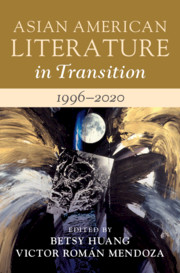Book contents
- Asian American Literature in Transition, 1996–2020
- Asian American Literature in Transition
- Asian American Literature in Transition, 1996–2020
- Copyright page
- Contents
- Illustrations
- Contributors
- Series Preface
- Acknowledgements
- Introduction
- Part I Neoimperialisms, Neoliberalisms, Necropolitics
- Part II Intersections, Intimacies
- Part III Genres, Modalities
- Chapter 9 The Asiatic Modal Imagination
- Chapter 10 Revisualizing Race
- Chapter 11 Contemporary Asian American Women’s Popular Literature and Neoliberal Form
- Chapter 12 This Is Not a Page
- Part IV Movements, Speculations
- Bibliography
- Index
Chapter 11 - Contemporary Asian American Women’s Popular Literature and Neoliberal Form
from Part III - Genres, Modalities
Published online by Cambridge University Press: 27 May 2021
- Asian American Literature in Transition, 1996–2020
- Asian American Literature in Transition
- Asian American Literature in Transition, 1996–2020
- Copyright page
- Contents
- Illustrations
- Contributors
- Series Preface
- Acknowledgements
- Introduction
- Part I Neoimperialisms, Neoliberalisms, Necropolitics
- Part II Intersections, Intimacies
- Part III Genres, Modalities
- Chapter 9 The Asiatic Modal Imagination
- Chapter 10 Revisualizing Race
- Chapter 11 Contemporary Asian American Women’s Popular Literature and Neoliberal Form
- Chapter 12 This Is Not a Page
- Part IV Movements, Speculations
- Bibliography
- Index
Summary
This chapter contextualizes contemporary Asian American literature in its innovative development of generic traditions, a ubiquitous screen culture and transmedia landscape, and the persistence of feminized cultural forms in the neoliberal global economy. It summarizes the constraints and possibilities that Asian American authors encounter when they write in the contemporary idiom of popular genres that target readers as women. Authors deploy forms aware of limitations and with the aim of engaging in dialogue about the belonging that popular literature addresses, both by design in a literary culture that neoliberal governance calls upon to offer templates for citizenship, and through authors’ and readers’ disidentification with exploitative mandates for entrepreneurial labor and instrumentalized intimacy. Drawing on affect theory to highlight romantic consumerism, emotional management, and individual investment in contemporary literary culture, the chapter considers how popular forms may challenge these features and analyzes the South Asian American example of Shilpa Somaya Gowda’s international bestselling novel Secret Daughter. The chapter argues that, rather than naturalize feminized and racialized affective labor as fundamental to neoliberal capitalism, Asian American women’s literature in many cases critically stages it, presenting affective labor that gestures toward a post-work imaginary and a different future.
Keywords
- Type
- Chapter
- Information
- Asian American Literature in Transition, 1996–2020 , pp. 216 - 238Publisher: Cambridge University PressPrint publication year: 2021

